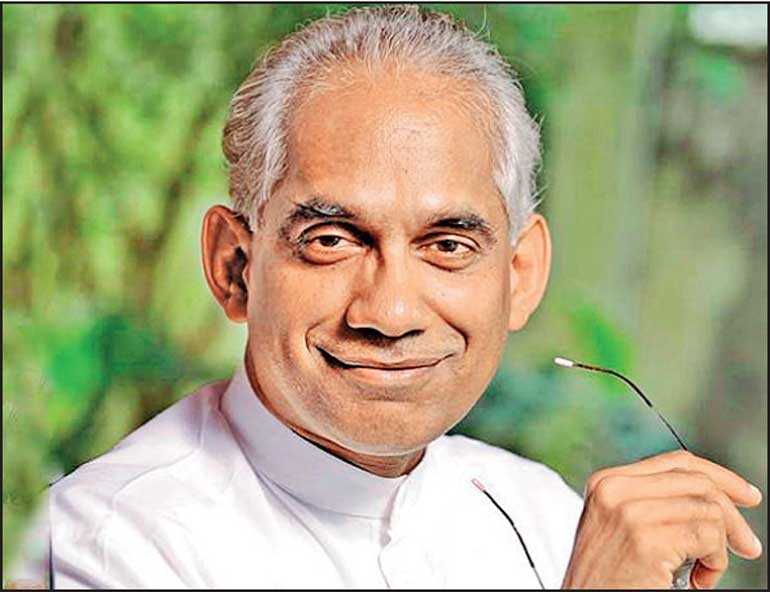Friday Feb 27, 2026
Friday Feb 27, 2026
Friday, 11 September 2020 00:00 - - {{hitsCtrl.values.hits}}

Eran Wickramaratne
By Chandani Kirinde
Samagi Jana Balawegaya (SJB) MP Eran Wickramaratne yesterday warned Parliament that Sri Lanka should prepare for its worst Budget deficit in 35 years, a situation that he said was brought on by the policy errors of the Government.
“It is fully expected for expenditure to increase during a health crisis to support health expenditure and to support livelihoods, but that is not what has happened. The crisis has occurred due to the collapse in Government revenue. That is why the crisis has occurred. This is the policy error and the sooner it is admitted and corrected the Government can get on the right track,” Wickramaratne said.
He was taking part in the debate on six Notifications under the Ports and Airports Development Levy Act, three Orders under the Customs Ordinance and six Orders under the Revenue Protection Act presented to the House for approval by the Government.
He said that under the previous Government, Sri Lanka achieved an improved fiscal position after several years with the Budget deficit kept at 5.3% of GDP during this period.
This however began to deteriorate by the end of 2019 because of the Government‘s irresponsible tax reductions in early 2020. This allowed the situation to get progressively worse in the past as the impact from COVID-19 deepened, the former State Minister of Finance added.
“Government revenue has declined by 28% compared to 2019. Recurrent expenditure increased by 10%. The Budget deficit has increased by 41%. Development spending, that is capital expenditure, has reduced by 1.1%. And Government debt has increased by Rs. 1,020 billion in just six months rising from Rs. 13,000 billion to over Rs. 14,000 billion from January to June in 2020,” he said.
Wickramaratne warned the fiscal situation will get worse as the year progresses with additional costs brought on by a 10% increase in public sector employees.
Wickramaratne said that the import ban will start to hit public revenue in the second half. “Corporate taxes will be sharply down and Sri Lanka should prepare for its worst Budget deficit in 35 years,” he said.
The SJB MP said that in spite of the reduction in tax relief to the public there has been no benefit felt by the people. “Prices of essentials have in fact increased despite the reduction and exemption in some taxes. Food price inflation reached 12.9% in July. The National Consumer Price Index reached 6.1% in July. These are not our statistics. These are statistics coming out of Government Departments,” he said.
He went on to say that the previous Government was able to rectify a regressive tax system. “The direct tax percentage was 25% in 2019 and 75% was indirect tax. When we took responsibility for the Government, the direct taxes were only 12% and we have been able to correct a regressive tax system taking away or lessening burden on the poor in this country.”
As a result of the poor fiscal management he warned that Sri Lanka could lose the opportunity to raise funds for debt repayment at competitive rates from international financial markets and would have to rely on dwindling reserves to repay debt.
“By the middle of last year Government reserves were $ 8.9 billion. But within one year the reserves were $ 6.7 billion. There are major debt repayments in 2020, 2021 and 2022. Sri Lanka has to pay mainly sovereign bonds. Sri Lanka has another $ 4 billion debt maturing from 2020 to 2024.”
Wickramaratne said that the country’s debt is about 87% of GDP and of this 57% was foreign debt, which was also non-concessional as opposed to only 2.5% 15 years ago.
Most of the non-concessional borrowings of 75% or $ 15.3 billion were international sovereign bonds. Wickramaratne said China has now displaced Japan as the largest bilateral creditor to Sri Lanka accounting for 12.4% of Government debt. Out of $ 4.1 billion of Chinese lending to Sri Lanka, only $ 760 million was classified as official bilateral debt. The rest is considered as commercial debt.
Wickramaratne said that external debt in Sri Lanka is predominantly by the public sector and was very high in relation to current account receipts. “The pressure will intensify in 2020 and 2021 when current account receipts will fall sharply amidst the down turn in tourism, exports, and remittances. This will also push up financing costs from capital markets.”
He added that the Government has an issue with State-Owned Enterprises (SOE) as the Treasury has issued guarantees to the Ceylon Petroleum Corporation (CPC), the Road Development Authority (RDA), the National Water Supply and Drainage Board, Ceylon Electricity Board (CEB) and SriLankan Airlines.
“SOEs like CEB, CPC, and SriLankan Airlines are problematic for every Government and therefore, we need to restructure their debt. Giving Government guarantees is only manhandling the data, making the Government look good. Eventually that risk is not a contingent liability. It is a direct liability, on top of Sri Lanka’s sovereign debt and therefore the Government needs to look at that,” he told fellow lawmakers.
He charged that the Government had mishandled the fiscal part at the beginning and then turned to the Central Bank and pressured them to rebalance the situation using monetary policy.
“Even though you forced out two members of the Monetary Board Dr. Dushni Weerakoon and Nihal Fonseka, and despite issuing threats against senior Central Bank officials, it is clear this is not a matter of people, it is a matter of policy that you need to correct. They have done their utmost. They have provided liquidity. But the credit growth in May, June and July has been negative. It cannot be solved only on the monetary side because you have left little space on the fiscal side,” he said.